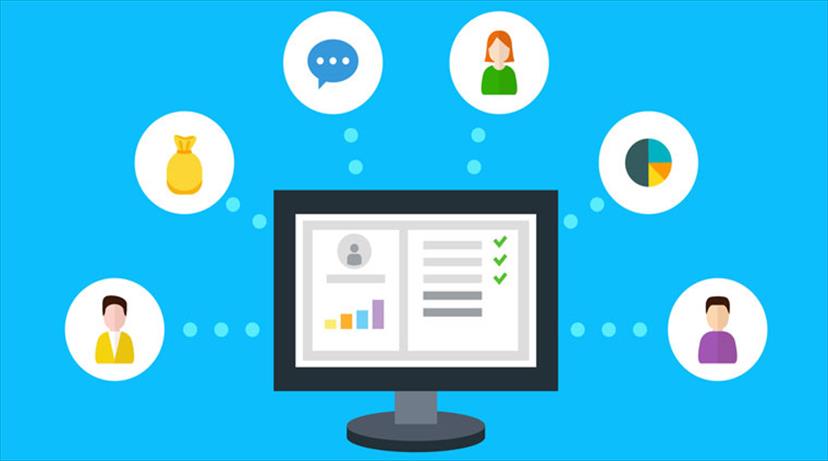One of the best company to work and IT solutions. Delivered product quickly and very fast. It was really mice working with them. I will give them move orders.
IMPLEMENTING AN ERP SYSTEM AND TAX ACCOUNTING SOFTWARE| TRITAN ERP |
ERP and accounting systems can be complex and their implementation often requires significant changes in the work practices of the staff, which takes considerable planning and adjustments.

IMPLEMENTING AN ERP SYSTEM AND TAX ACCOUNTING SOFTWARE
Introduction
Enterprise Resource Planning (ERP) systems help organizations simplify their accounting needs through the integration of data. It gives you an adequate view of all areas of the company, and this facilitates you to make quick and more precise decisions that influence the operations of your organization.
Insights into financial data facilitate cost efficiency and enhance the financial productivity of the company. In this blog post today, we will share with you some of the advantages you will have from utilizing an ERP system for your accounting and taxation department.
The accounting department of any organization is essential. There are multiple areas you can use an integrated ERP system, and here are some of them:
- You can utilize an ERP system to measure the capital requirements and for the supervision of cash.
- You can very seamlessly decide with the budget of your accounting firm.
- Allocation of costs for numerous activities such as labor, raw material, and transportation.
- Management of payments, including those made to the vendors and paying salaries to staff.
- Tracing capabilities and Organizing accounting needs
- ERP system enables you to utilize it as a financial management system. It enriches various financial tasks such as customer payment schedules, credit management, and payment tracking.
- It’s simple to organize billing, revenue, and payments as it has a great level of tracking capabilities and it’s an automated system, Even better, you can utilize an ERP system to track revenues made by the company, invoicing, cost estimation, and budgeting.
Quality data and financial information
With ERP technology, the accounting department has simple access to the data. Companies have well-organized procedures and resources, facilitating them to sustain good financial measures. Financial information is moreover ensured and it provides you an opportunity to co-author, manage, and edit when you have permission to access it.
Companies that use different systems for accounting and sales activities, have to organize the data manually. On the other hand, for a highly integrated ERP system for accounting, there is an automatic transfer of data too. Therefore, you don’t have to organize data manually, making it rapid, precise, and consistent.
Automated data
Companies with automated systems can grow their companies because they have the flexibility to analyze their core operations. An ERP system assures that your accounting is automated. It simplifies operations applicable to accounts receivable, accounts payable, enhances cash flow difficulties, and cash management. It becomes pretty simpler to oversee the whole company by producing information and assembling it.
You can utilize financial management modules of an ERP that will maintain track of accounting data that are in line with worldwide standards. For this purpose, you have the option of selecting a framework in various languages, charts of accounts, and currencies.ERP system enables you to compile financial data from several departments to build reports and financial statements. This is the reason why the system is costly as it makes the procedures susceptible to perform.
Fewer errors
- There is always a likelihood that an individual can make a mistake while manually capturing data. By losing focus and losing main entries, it can cause troubles in your accounting. Inaccurate accounting data will influence the quality of financial estimations and financial reports. This mistake can have horrible impacts on your finances including tax complications.
- An ERP system for accounting prevents such mistakes from happening because the system is automated. This gives you accurate data on the financial situation of various departments of your organization.
- A comprehensive ERP system is moreover GAAP compliant. GAAP refers to the accounting standard that gives a systematic procedure for recording financial transactions. Thus, a full ERP system helps you to practice financial reporting that is acceptable by numerous accounting standards such as GAAP.
Primary Benefits of the TDS and Service Tax Modules in Tritan ERP Software Solutions is as follows:
- You can easily maintain vast Data for TDS, Such as Deductor, Deductions, Challans, and Computation.
- You can develop returns and Paper returns for Form 26Q & 27Q.
- You can develop a state statutory report form, Sales register, and Purchase register, deduction, and remittance report.
- Simple to maintain challan number and its details with bank code.
- Seamlessly Integrated with Tritan ERP
- Our ADDONS extra precisely and in the favor of the Indian Tax Scenarios.
- Routine invoices can be configured for clients thus, saving time.
Tax Automation
Software solutions to assure detailed compliance
- Utilizing technology to manage meaningful indirect tax processes and automate transaction tax decisions decreases the risk of manual mistakes and enhances accuracy and all-around efficiency most organizations operate some form of Enterprise Resource Planning (ERP) software to organize order-to-cash, procure-to-pay, and record-to-report, but within each process, the business must make decisions at the transactional level as to - " how to apply indirect tax and, where feasible, what tax can be recovered".
- Automating decisions and procedures on a multi-jurisdictional basis (e.g., cities, counties, states, provinces, and countries) needs the execution of detailed logic. This logic can either be created into the ERP software (i.e., the native environment) or organized through expert third-party software that interfaces with the ERP system (i.e., the tax engine).
- In addition to the procedure applied for determining tax treatment, the comprehensive system must be able to automate invoicing processes by local jurisdiction regulations, run reports that assist indirect tax compliance procedures, and manage vendor, customer, and product data to assure key information is accessible to support the various procedures.
Our Value
Through our experienced team of global indirect tax and technology experts, we can assist you:
- Determine any improvements to be made and specify the requirements
- Help in your decision-making as to which choices best meet company needs and whether to optimize current software, implement new software or add a tax engine
- Design processes that meet the altering compliance environment, especially as tax authorities boost the usage of technology for filing and auditing objectives
- Configure software to assure tax decisions are precise and immediate.
- Develop reporting requirements crucial to assist automated compliance process.
- Assure invoicing templates meet local jurisdiction principles and regulations
- Analyze vendor, customer, and product data needs
- Assure data is mapped accurately and completely when it migrates from one system to another
- We give testing to assure everything functions as designed as well as training for the individuals who will be operating the system.
Top Motives to Utilize an ERP System for Accounting
I know you’re already familiarized with utilizing your favorite accounting software that stores your organization’s financial data. But the trouble most manufacturers encounter is that this software is restricted to giving accounting solutions alone and in no way aid in simplifying your other everyday business procedures.
You need to replace your main accounting software with an integrated Tritan ERP solution and save your business from the counterassault of lost sales and disappointed customers! Why do manufacturers require more than accounting software? A leading study indicates that ERP gives company-wide advantages to various organizations. This promotes advancement in supply chain management promoting profits, reduction in costs, and standardize processes. ERP system incorporates whole business data and not just financial entries, to allow you to have better visibility from everyday operations.
Manufacturers require a single ERP system to simplify business procedures without having to depend on many systems. Below are the top reasons why you need to utilize an ERP for Accounting:
1. 360-degree view of your financials and all-around business
Manufacturers always prefer to economize resources and for this objective, they utilize ERP accounting software to foresee behavior and measure patterns of everyday business processes influencing sales, marketing, and supply chain management.
ERP system for accounting provides a 360-degree synopsis of financial functions with reports displayed via. charts, graphs, and visual assistance. These financial reports assist companies to predict the future effects and manage risks better.
2. Streamline business processes
Low quality of financial records can affect the company. When making decisions about business investments, precision in the financial reports is critical. ERP system ascertains standardized strategies to achieve real-time financial reporting and productive delivery of economic information.
Financial accounting through ERP is thought to be more critical, as it is solely based on definitive information accredited in the system. You don’t have to manually transfer data between platforms while utilizing an integrated ERP. Most manufacturing companies automate accountancy-related duties like auditing compliance and reconciliation, with an ERP.
3. The linkage between financials and manufacturing procedures
- ERP streamlines the affiliation procedure by giving access to the interdepartmental database. The information of various functional areas like CRM, Accounting, HR, and Supply Chain Management is aimed into one centralized location enabling real-time affiliation.
- Manufacturing business procedures are more tricky and therefore various manufacturers depend on ERP systems to deal with a huge volume of data.
- ERP software for accounting is more detailed because it provides a holistic, incorporated, and transparent view of business procedures and is exclusively based on standard information functional in the system.
4. Automated workflows
- You can search financial transactions like automated audit info in real-time.
- You no more require paper documents and can moreover make timely payments and enhance precision.
- Due to automated financial reports, ERP saves time for accounting procedures enabling quality time to auditors, who spend less time for closing entries.
- The automated reporting provides top management comparable and comprehensive financial material, necessary for decision making.
- Such advantages drive companies to invest in ERP software and enhance productivity.
5. Cost savings
ERP systems integrate delivery planning and managing tools, communication characteristics, and order processing choices in one platform. With the usage of an ERP, the company can decrease operating expenses and save labor expenses, because of business procedure automation.
Did you know that ERP users have conserved 10 to 15% of their operating expenses and 30 % of labor expenditures? Logistics is one of the major operations in a manufacturing business.?Take for instance transporting cargo. It is a challenging task as you must deem the details of every single freight such as regulating the schedule of drivers or even gauging the ability of each vehicle.
ERP software is built particularly for logistics and frequently incorporates delivery planning, order processing alternatives, communication, and management characteristics into one exclusive platform. It furthermore facilitates you to conserve a customer database, making it simpler to look up finalized and ongoing deliveries.
Conclusion
ERP enables you to attain better visibility and control of operations stemming from substantial cost savings. There are countless reasons why accounting or taxation companies are utilizing ERP systems for accounting. The primary advantage is that the fragmented business processes become centralized into ERP databases, real-time visibility of customary work procedures, and better-streamlined department. If you plan to invest in an ERP accounting software or manufacturing ERP, feel free to contact us for a free demo and we can share more deep insights. You may furthermore request a free demo anytime! Learn more about our ERP approach to beneficial VAT and sales and utilize our tax automation solutions








0 Comment